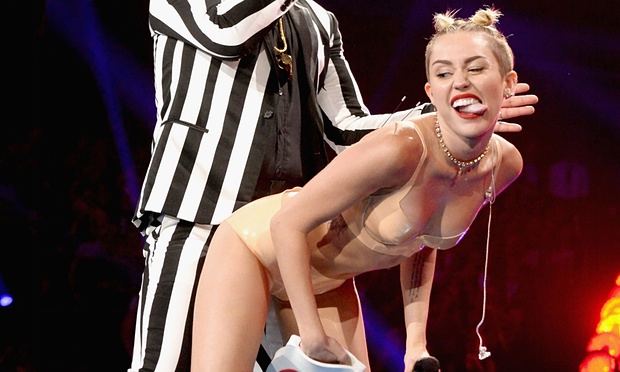What do the twitterati think about twerking? Is it still hot fo’ shizzle or is it just meh? If you would struggle to decipher that opening sentence, you can now consult the Oxford English Dictionary, which has included those four phrases in more than 500 new entries announced on Thursday.
Twerking seems to be an unlikely contender for first time inclusion – for a word to qualify, it must have been have been in popular use for at least 10 years in novels and newspapers. The thrusting dance was popularised by the singer Miley Cyrus at a 2013 MTV awards show and, two years on, it already seems somewhat passé.

But twerking, which the dictionary describes as dancing “in a sexually provocative manner, using thrusting movements of the bottom and hips while in a low, squatting stance”, is almost 200 years old.
Researchers found it was first used as a noun in 1820, spelt “twirk”, to refer to a “twisting or jerking movement” or “twitch”. The verb is believed to have emerged later in 1848, and the “twerk” spelling was popularly used by 1901.
Fiona McPherson, a senior editor of Oxford English Dictionary, said: “We are confident that it is the same origins as the dance. There has been constant use up into the present day to mean that same thing. I think it’s quite spectacular, the early origins for it. We were quite surprised.”
Popular culture may often be given credit for inventing words it had merely popularised, the research found, citing “meh”, an interjection communicating a lack of enthusiasm, believed to have been first used in 1992 but popularised by the Simpsons.
“Twitterati”, describing users of the social networking site, and “fo’ shizzle”, slang speak meaning “for sure”, have also been added to the dictionary this year.
New trends in technology have a key influence on the inclusion of new words. Though the word “webisode” has been in use since 1996, the increasing popularity of online-only TV shows such as Netflix’s House of Cards and Orange is the New Black may have been a prompt for its inclusion this year.
“Vape” was added to the dictionary in 2014, but only this year was the noun “e-cigarette” added. It is defined as a “cigarette-shaped device containing a nicotine-based liquid or other substance that is vaporised and inhaled, used to simulate the experience of smoking”. The word’s usage can be traced back to 2007.
Several new additions have an environmental focus, such as the popular gap-year pursuit of “voluntourism”, and “ecotown”, defined as a “new town designed to have a minimal impact on the environment and to facilitate an environmentally responsible lifestyle for its residents”.
Another addition is “freegan”, a noun or adjective first recorded in use in the Sunday Times in 1997, meaning a “person who eats discarded food, typically collected from the refuse of shops or restaurants, for ethical or ecological reasons”.
McPherson said all the new entries were deemed to have earned their place in the history of the English language.







